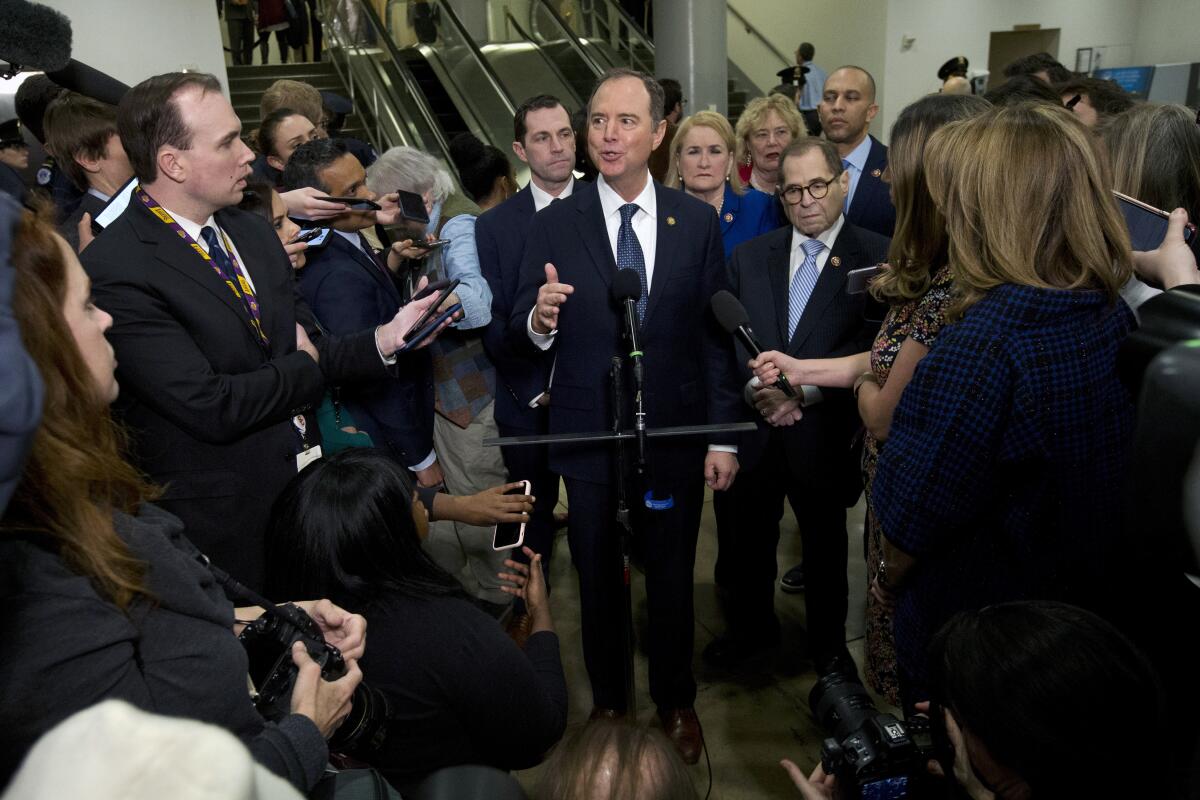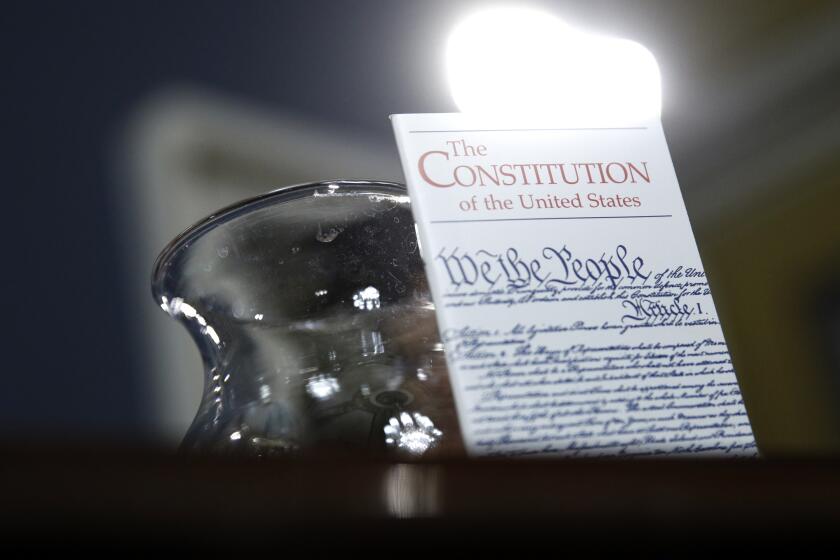Trump shows anxiety as Democrats lay out case against him in Senate impeachment trial

- Share via
WASHINGTON — President Trump on Wednesday hardened his opposition to allowing former national security advisor John Bolton to testify in his Senate impeachment trial, as House Democrats began their methodical arguments for removing the president from office for having abused his power to “cheat an election.”
The president cited national security concerns in explaining why Bolton, who was ousted in September, shouldn’t be a Senate witness. But he added a note of apprehension about what his former advisor might tell senators: “I don’t know if we left on the best of terms.”
“You don’t like people testifying when they didn’t leave on good terms,” Trump said at a news conference before departing from the World Economic Forum in Davos, Switzerland. “And that was due to me, not him.”
Trump’s comments about Bolton and his more than 140 tweets, a daily record for him, suggested his heightened anxiety as the Senate for only the third time in history sat in judgment of a president. As House Democrats began their formal arguments, Rep. Adam B. Schiff of Burbank, the lead House manager, read a quote from Alexander Hamilton to suggest that Trump was just the sort of despot the Framers had in mind in drafting the Constitution’s impeachment clause.
The Founders “knew what it was like to live under a despot, and they risked their lives to be free of it. They knew they were creating an enormously powerful executive, and they knew they needed to constrain it,” Schiff said.
The Republican Senate majority is expected to acquit Trump on the House’s charges — that he abused his office by withholding military aide for Ukraine to coerce its president to announce an inquiry of former Vice President Joe Biden, and then obstructed Congress’ efforts to investigate his actions. Yet the rare indignity of his impeachment and trial is certain to undermine his legacy.
Trump’s lawyers did not seek a vote to dismiss the charges before opening arguments. Several Republicans had signaled they would oppose a dismissal. Those in reelection races this year, especially, did not want to appear to be ignoring their constitutional responsibility to conduct a trial.
House Democrats are about to begin formally presenting their case in the Senate impeachment trial of President Trump after a grueling 12-hour partisan fight over the rules. Led by Rep. Adam B. Schiff, the Democratic managers now have three days to present the House’s arguments for impeachment. Watch the trial live and follow our coverage.Watch live>>
The Senate punted decisions about calling any witnesses until perhaps the end of next week. Meanwhile, the House managers and Trump’s lawyers each have 24 hours to present arguments, stretching over six days. Then senators have up to 16 hours to submit written questions to the lawyers, through Chief Justice John G. Roberts Jr., who is presiding, as the Constitution requires.
Though Trump reiterated to reporters at Davos that he would welcome the Senate calling witnesses, he has repeatedly directed administration officials to defy subpoenas for documents and testimony.
Senate Minority Leader Charles E. Schumer (D-N.Y.) excoriated Republicans for limiting House managers’ ability to call witnesses and introduce evidence unavailable to the House before its impeachment vote in December. “They want as much of this hidden from the American people as possible,” he said at a news conference.
Schumer later said Democrats would not negotiate with Republicans over witnesses, saying the idea that Democrats would agree to call Biden or his son Hunter Biden to testify in exchange for testimony from Bolton and other administration officials was “off the table.”
After months of briefs and depositions in the House, the Democrats outlined administration activities over months last summer to freeze $391 million in aid to Ukraine while Trump demanded that President Volodymyr Zelensky announce investigations of Biden, a front-runner for the Democratic presidential nomination, and his son. Hunter Biden was paid for serving on a Ukrainian corporate board while his father was vice president, but is not alleged to have done anything wrong.
The new Ukrainian president sought the congressionally approved aid, and a White House meeting with Trump, as crucial shows of U.S. support as his country fights a war against Russia-backed separatists.
Schiff pointed to House testimony from Trump’s ambassador to the European Union, Gordon Sondland, who said everyone in the administration, including Trump, was “in the loop” as part of the president’s effort to pressure Ukraine.
“The president was the key player in the scheme — ‘Everyone was in the loop,’” Schiff said. “He directed the actions of his team. He personally asked a foreign government to investigate his opponent. These facts are not in dispute.”
The managers who followed Schiff went into further detail and used incriminating video clips of Trump’s and other government officials’ prior comments, to illustrate the lengths to which the president and his aides went to coerce Ukraine to help against the Bidens and the national Democratic Party.
As the evening wore on, senators were increasingly seen taking breaks to their respective party cloakrooms at the rear of the chamber. Sen. Dianne Feinstein (D-Calif.) left an hour early. A spokesman said Feinstein was feeling ill but was expected to be back in the chamber Thursday.
The Democrats seemed to try to alleviate the bitterness between the parties that built amid the previous day’s pretrial arguments. Some sparring on Tuesday, particularly between Trump’s White House counsel, Pat Cipollone, and Rep. Jerrold Nadler of New York prompted a rare rebuke after midnight from Roberts.
The admonition did not extend to Trump in Davos. The president repeatedly described Democrats including Schiff and Nadler as “corrupt” and “sleazebags.”
Trump’s attorneys are expected to present their case beginning Saturday. Despite the details Democrats laid out, and some senators’ acknowledgment that they hadn’t paid close attention to the Trump officials’ testimony in the House, several Republicans dismissed the case before them.
“I didn’t hear anything new — at all,” said Sen. John Barrasso of Wyoming. “It still seems to me this was an effort by the Democrats in a very partisan way to bring a case against President Trump because they weren’t happy with the results of the 2016 election and are concerned they’re going to have real problems in the 2020 election.”
Republicans, following Trump’s lead, have argued that his actions were within his authority and certainly not a crime. Most constitutional experts, however, agree that impeachment and removal from office does not require a crime, only evidence of an abuse of power.
Among Trump’s most vocal defenders were Sens. Rand Paul of Kentucky and Lindsey Graham of South Carolina, who exactly four years ago were both campaigning for president against Trump in Iowa, and challenging his fitness for office. Paul told reporters Wednesday that Democrats’ attacks, including that Senate Republicans are covering up for Trump, would backfire and unify Republicans behind him. “The longer Adam Schiff can speak,” he said, “the better, because it’s unifying Republicans.”
Graham and other Republicans slammed Democrats for trying to oust Trump so close to the election. Democrats counter that they had no choice because the alleged offense involves Trump’s effort to improperly influence the 2020 campaign.
Several Republicans have suggested they might break with the president — and with Senate Majority Leader Mitch McConnell (R-Ky.) — and allow Democrats to call witnesses who declined to testify in the House hearings, including Bolton and acting White House Chief of Staff Mick Mulvaney.
Democrats would also like to call Lev Parnas, an associate of Trump’s personal attorney, Rudolph W. Giuliani. Parnas has said he worked under Trump’s authority to cajole Ukrainian officials to investigate Biden and Democrats.
Bolton, according to witnesses who testified in the House, was upset by Trump’s pressure tactics against Ukraine and instructed aides to contact attorneys and avoid becoming complicit in what he derisively likened to a “drug deal.” He recently said he would testify if subpoenaed, but it remains unclear whether he would implicate the president.
Trump is hoping for a relatively brief trial to expedite an acquittal, after which he would claim exoneration in what he calls a “witch hunt.” A poll from Pew Research Center released Wednesday showed a slight majority of Americans, 51%, believe he should be removed from office compared with 46% who say he should stay on the job. A far greater majority, 70%, say he probably or definitely acted unethically, while 63% said he probably broke the law.
Bierman reported from Washington. Megerian reported from Davos. Times staff writers Jennifer Haberkorn and Sarah D. Wire in Washington contributed to this report.
More to Read
Get the L.A. Times Politics newsletter
Deeply reported insights into legislation, politics and policy from Sacramento, Washington and beyond. In your inbox three times per week.
You may occasionally receive promotional content from the Los Angeles Times.













